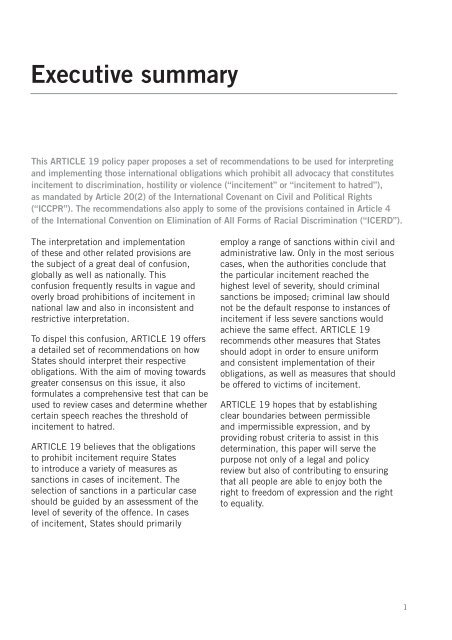ARTICLE-19-policy-on-prohibition-to-incitement
ARTICLE-19-policy-on-prohibition-to-incitement
ARTICLE-19-policy-on-prohibition-to-incitement
You also want an ePaper? Increase the reach of your titles
YUMPU automatically turns print PDFs into web optimized ePapers that Google loves.
Executive summary<br />
This <str<strong>on</strong>g>ARTICLE</str<strong>on</strong>g> <str<strong>on</strong>g>19</str<strong>on</strong>g> <str<strong>on</strong>g>policy</str<strong>on</strong>g> paper proposes a set of recommendati<strong>on</strong>s <strong>to</strong> be used for interpreting<br />
and implementing those internati<strong>on</strong>al obligati<strong>on</strong>s which prohibit all advocacy that c<strong>on</strong>stitutes<br />
<strong>incitement</strong> <strong>to</strong> discriminati<strong>on</strong>, hostility or violence (“<strong>incitement</strong>” or “<strong>incitement</strong> <strong>to</strong> hatred”),<br />
as mandated by Article 20(2) of the Internati<strong>on</strong>al Covenant <strong>on</strong> Civil and Political Rights<br />
(“ICCPR”). The recommendati<strong>on</strong>s also apply <strong>to</strong> some of the provisi<strong>on</strong>s c<strong>on</strong>tained in Article 4<br />
of the Internati<strong>on</strong>al C<strong>on</strong>venti<strong>on</strong> <strong>on</strong> Eliminati<strong>on</strong> of All Forms of Racial Discriminati<strong>on</strong> (“ICERD”).<br />
The interpretati<strong>on</strong> and implementati<strong>on</strong><br />
of these and other related provisi<strong>on</strong>s are<br />
the subject of a great deal of c<strong>on</strong>fusi<strong>on</strong>,<br />
globally as well as nati<strong>on</strong>ally. This<br />
c<strong>on</strong>fusi<strong>on</strong> frequently results in vague and<br />
overly broad prohibiti<strong>on</strong>s of <strong>incitement</strong> in<br />
nati<strong>on</strong>al law and also in inc<strong>on</strong>sistent and<br />
restrictive interpretati<strong>on</strong>.<br />
To dispel this c<strong>on</strong>fusi<strong>on</strong>, <str<strong>on</strong>g>ARTICLE</str<strong>on</strong>g> <str<strong>on</strong>g>19</str<strong>on</strong>g> offers<br />
a detailed set of recommendati<strong>on</strong>s <strong>on</strong> how<br />
States should interpret their respective<br />
obligati<strong>on</strong>s. With the aim of moving <strong>to</strong>wards<br />
greater c<strong>on</strong>sensus <strong>on</strong> this issue, it also<br />
formulates a comprehensive test that can be<br />
used <strong>to</strong> review cases and determine whether<br />
certain speech reaches the threshold of<br />
<strong>incitement</strong> <strong>to</strong> hatred.<br />
<str<strong>on</strong>g>ARTICLE</str<strong>on</strong>g> <str<strong>on</strong>g>19</str<strong>on</strong>g> believes that the obligati<strong>on</strong>s<br />
<strong>to</strong> prohibit <strong>incitement</strong> require States<br />
<strong>to</strong> introduce a variety of measures as<br />
sancti<strong>on</strong>s in cases of <strong>incitement</strong>. The<br />
selecti<strong>on</strong> of sancti<strong>on</strong>s in a particular case<br />
should be guided by an assessment of the<br />
level of severity of the offence. In cases<br />
of <strong>incitement</strong>, States should primarily<br />
employ a range of sancti<strong>on</strong>s within civil and<br />
administrative law. Only in the most serious<br />
cases, when the authorities c<strong>on</strong>clude that<br />
the particular <strong>incitement</strong> reached the<br />
highest level of severity, should criminal<br />
sancti<strong>on</strong>s be imposed; criminal law should<br />
not be the default resp<strong>on</strong>se <strong>to</strong> instances of<br />
<strong>incitement</strong> if less severe sancti<strong>on</strong>s would<br />
achieve the same effect. <str<strong>on</strong>g>ARTICLE</str<strong>on</strong>g> <str<strong>on</strong>g>19</str<strong>on</strong>g><br />
recommends other measures that States<br />
should adopt in order <strong>to</strong> ensure uniform<br />
and c<strong>on</strong>sistent implementati<strong>on</strong> of their<br />
obligati<strong>on</strong>s, as well as measures that should<br />
be offered <strong>to</strong> victims of <strong>incitement</strong>.<br />
<str<strong>on</strong>g>ARTICLE</str<strong>on</strong>g> <str<strong>on</strong>g>19</str<strong>on</strong>g> hopes that by establishing<br />
clear boundaries between permissible<br />
and impermissible expressi<strong>on</strong>, and by<br />
providing robust criteria <strong>to</strong> assist in this<br />
determinati<strong>on</strong>, this paper will serve the<br />
purpose not <strong>on</strong>ly of a legal and <str<strong>on</strong>g>policy</str<strong>on</strong>g><br />
review but also of c<strong>on</strong>tributing <strong>to</strong> ensuring<br />
that all people are able <strong>to</strong> enjoy both the<br />
right <strong>to</strong> freedom of expressi<strong>on</strong> and the right<br />
<strong>to</strong> equality.<br />
1


